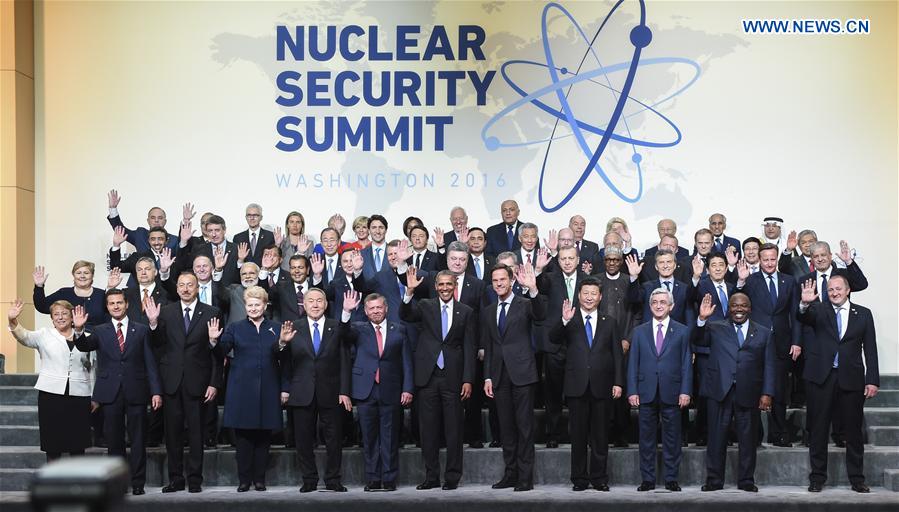Full coverage: Xi Visits Czech Republic, Attends Nuclear Security Summit
by Xinhua writer Zhu Lei
NEW YORK, April 6 (Xinhua) -- Since the first Nuclear Security Summit (NSS) was held in Washington, D.C. in 2010, world leaders have made modest advances in strengthening the nuclear security system, but the job of improving security for nuclear weapons and weapons-usable nuclear materials is far from finished.

WASHINGTON D.C., April 1, 2016 (Xinhua) -- Chinese President Xi Jinping (4th R, front) poses for a group photo with other leaders attending the fourth Nuclear Security Summit in Washington D.C., the United States, April 1, 2016. (Xinhua/Xie Huanchi)
As the curtain of the fourth and final NSS fell in Washington last week marking the end of the NSS process initiated by U.S. President Barack Obama, more and enhanced cooperation between major countries is needed to sustain awareness and cooperation in a world where the risk of nuclear terrorism remains very real, experts say.
Kelsey Davenport, director of nonproliferation policy at the Arms Control Association, said that "over the past six years, the global nuclear security system has been strengthened by the summit process," citing that the number of states with weapons-usable nuclear materials in the civil sphere has dropped from 32 to 24.
And all of the 53 countries that participate in the summit process have taken steps to enhance domestic regulations or laws that govern nuclear security and combat illicit trafficking, she added.
"Despite these accomplishments, the global nuclear security system remains an incomplete patchwork of voluntary initiatives, guidelines and recommendations," she said.
It is critical that countries continue to be committed to enhancing domestic nuclear security and assisting countries that need to do more to protect nuclear and radiological materials, she added.
One of the areas where the major powers can play a key role is continuing to assist countries that do not have the technical expertise or funding to adequately train personnel, secure facilities, ship out nuclear materials or monitor border, Davenport said.
What is outstanding in this aspect is the newly-established Center of Excellence on Nuclear Security in Beijing, with a capacity of training about 2,000 nuclear security staff every year.
It is the largest nuclear program financed by the Chinese and U.S. governments, and also the largest nuclear security center in the Asia-Pacific region.
U.S. Secretary of Energy Ernest Moniz has called the facility a "tremendous resource for China and the entire region," noting that "our partnership on the nuclear security realm will be so important to the world."
In addition, on the occasion of the fourth NSS, the United States and China issued a joint statement on nuclear security, pledging their commitment "to working together to foster a peaceful and stable international environment by reducing the threat of nuclear terrorism and striving for a more inclusive, coordinated, sustainable and robust global nuclear security architecture for the common benefit and security of all."
Senior officials and experts in both countries spoke highly of the momentum in bilateral cooperation on nuclear security.
Matthew Bunn, a specialist in nuclear security at Harvard's John F. Kennedy School of Government, said he "was happy to see the U.S., China issue a joint statement on strengthening their nuclear security bilateral cooperation."
He believed that bilateral cooperation, especially between major countries, is one of the key tools to advance global nuclear security beyond 2016.
However, he pointed out "there is a lot to be done to try to rebuild cooperation between the United States and Russia."
The type of cooperation between Washington and Moscow has played a key role in helping countries ship out nuclear materials, Davenport said, adding that it is key in eliminating high-enriched uranium (HEU) from 10 countries over the course of the summit process.
Just this year, Uzbekistan became HEU-free, thanks to the cooperative work between the two countries, she said.
However, the cooperation between the two countries that control 90 percent of the world's nuclear weapons and materials has largely stalled after the Ukraine crisis in 2014.
The Nuclear Threat Initiative (NTI), a nonprofit organization based in Washington, said in a report released in January that only one country, Uzbekistan, has removed all of its dangerous nuclear materials in the past two years, sharply down from seven countries in the previous two years.
Today, 24 states still have one kilogram or more of weapons-usable nuclear materials, and nearly 2,000 metric tons of weapons-usable nuclear materials remain stored around the world, much of it still too vulnerable to theft, revealed the report -- the NTI Index recognized as the premiere resource and tool for tracking progress on nuclear security.
The risk is compounded by the fact that a terrorist group wouldn't need much nuclear material to make a nuclear bomb, it said, adding that cyber attacks are increasing -- nuclear facilities are just as vulnerable as other key infrastructure -- and a growing number of states are exploring nuclear energy even though they lack the legal, regulatory, and security frameworks to ensure that their facilities are secure as well as safe.
"All countries need to play a role. Leading countries in terms of nuclear programs, including China, Russia and the United States, have particularly important roles. However, countries without nuclear materials or facilities need to make sure their land is not used as staging grounds where terrorists can operate," said Page Stoutland, vice president of the Scientific and Technical Affairs at the NTI.
Xinhua reporter Wang Fan in New York also contributed to this story















